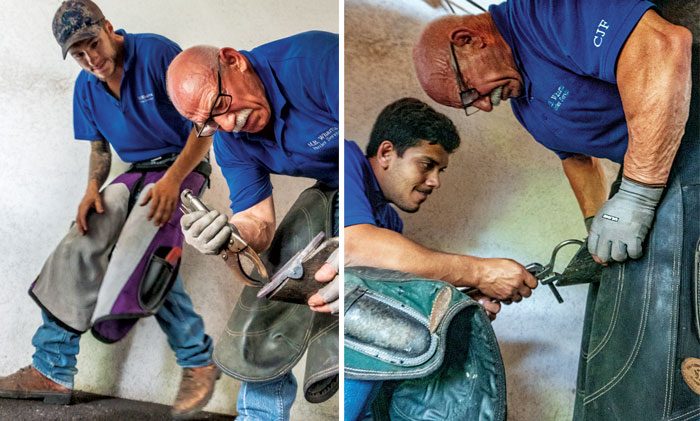Training young farriers aids longevity for veteran farriers in two ways. Obviously, they can decrease the amount of work for the lead farrier. By training and building mentees into skilled farriers, it can be enriching and bring motivation to both parties.
“Both of these guys are good horseshoers,” says Mike Wharton, a Wellington, Fla., farrier who employs Mike Orlando (top left) and Hector Goico (top right). “I look back at many of the outstanding farriers I had — I’m proud of those who are still shoeing.”
Many farriers have trouble finding help. And if you can find apprentices, can they match the standards of their practices?
Wharton says first understand your own program so that you can teach it. Wharton’s ideal candidate has the same values and some horse sense. Farrier experience isn’t as necessary. He wants apprentices who are polite and present themselves well to clients. He warns young farriers that they only have one chance to make a first impression, and that view is how clients will see them going forward. They need motivation to show up daily, but Wharton says it needs to be the right motivation.
“They must be interested in the work because of the horse,’’ Wharton says. “Yes, we want to be paid for our work, but if they are only driven by money, apprentices and helpers will burn out because this is too hard of a job to only be in it for the money. Keep the horse as the focus.”
As for keeping talent, Wharton says that you have to realize that every helper will eventually leave. He’s had helpers last as short as 6 weeks, and up to 13 years. To keep help around, Wharton says the key is to maintain their interest and motivation.
“Keep them hungry, encourage them to continue education or pursue a goal like certification. Give them a personal challenge,” he says. “How you communicate is also important. Encourage, don’t discourage, your help. Don’t talk down — remember where you started in this profession.”
Wharton enjoys seeing his help mature and take on accounts of their own. Even one horse at a barn can make a huge impact.
“You can gain an entire barn through one horse,” says Wharton, “but you can also lose an entire barn through one horse.”
Learn More
- A Shoeing Day with Mike Wharton: A day of shoeing top dressage horses in Wellington gives clues on sustaining success as a farrier.
- A World Cup Education: Jason Critton’s farrier team embraces the chance to learn from some of the best at the FEI jumping and dressage finals.
- Finding the Right Fit for Titanium: Farriers say newest generation of shoes have earned a place on their shoeing racks.









Post a comment
Report Abusive Comment